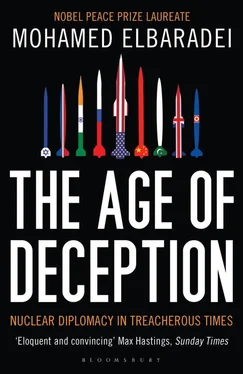At each meeting of the IAEA Board, I expressed my concern and our willingness to work with all parties toward a comprehensive solution that would address both North Korea’s security interests and the non-proliferation priorities of the international community. Behind the scenes, I asked various members of the six-party talks for information, but there seemed to be little to report.
I also used public forums to express my dissatisfaction. During an open discussion at the Council on Foreign Relations, I told the group: “What I worry about with North Korea is that it sends the worst signals to would-be proliferators: that if you want to protect yourself, you should accelerate your [nuclear] program—because then you are immune in a way. Then people will sit around the table with you. And if you do not do that fast enough, you might be subject to preemption”—referring, of course, to the military action in Iraq. [8] May 14, 2004. The discussion was moderated by Graham Allison, director of the Belfer Center for Science and International Affairs, John F. Kennedy School of Government, Harvard University.
I met with Colin Powell in Washington in June 2004. By that time, the six parties were finishing their third round of talks, with no breakthroughs in sight. Powell told me that he was open to taking a more flexible approach on North Korea. He speculated, however, that the North Koreans might be stalling until November. “If I were the North Koreans,” he said, “I would wait for the result of the elections—because if the Democrats were to win the White House, they most likely would adopt a more flexible approach.”
From what I could glean, in addition to the construction of the two power reactors, North Korea was pushing for more aid, as well as for security guarantees and eventual normalization of relations with the United States in exchange for giving up its nuclear program. The United States, and to some extent Japan, were pushing back. They wanted North Korea to completely dismantle its nuclear facilities and to do so in a way that would prevent any restart of fuel cycle operations; the United States also urged withholding international aid until North Korea had taken major, verifiable steps. China, Russia, and South Korea favored a more moderate, action-for-action approach.
No one was budging.
The diplomatic outlook grew progressively more gloomy. When the time came for the fourth round of talks, North Korea refused to attend, blaming the “hostile” stance of the United States. When I visited South Korea and Japan that fall, I realized that other members of the six-party talks were also unhappy with the Americans’ hard-line approach. South Korea’s vice foreign minister attributed the problem to a difference in perspective: for the United States, he said, North Korea is just another case of WMD; whereas “for us, the North Koreans are our enemies, but also our brothers.” Japan, I was told, would prefer to start focusing on North Korea’s plutonium separation, a proliferation risk that was undisputed, and defer the issue of alleged uranium enrichment. With the IAEA out of the country, there was no “freeze” in place to prevent North Korea from reprocessing its spent fuel, separating the plutonium, and building nuclear weapons.
Toward the end of that year, I was contacted confidentially by Bill Richardson, the governor of New Mexico. I had known Richardson since his stint as U.S. ambassador to the UN in 1997–98, and after that when he was secretary of energy. He wanted to see whether he could mediate the situation and was interested in going to North Korea as my envoy, an unusual but acceptable proposal. He added that he would like to keep his hand in foreign policy issues, which he obviously was missing in his role as governor.
Richardson had experience with North Korean diplomacy: as a U.S. congressional representative in 1996, he had successfully secured the release of Evan Hunziker, an American citizen held in North Korean custody; and in early January 2003, when the North Korean situation was falling apart, Pyongyang had sent its own envoys to meet with Richardson in New Mexico, presumably hoping to use him as an intermediary. He had also been sent to Baghdad to secure the release of two U.S. aerospace workers during Bill Clinton’s presidency and had traveled to Bangladesh in 1996 to secure a pardon for an American woman accused of heroin smuggling. So he had a record of mediation successes in problem areas, which often gained significant media coverage.
I agreed to support Richardson’s mission. He also set out to obtain State Department approval, which came in the form of a promise of military air transport, with the caveat that he would not be speaking on behalf of the U.S. government. Shortly thereafter, Richardson sent me a fax: the North Koreans, who had earlier been open to the visit, had changed their minds.
In another curious turn, I was asked by a divisional director of IAEA to see a Swedish banker by the name of Peter Castenfelt who had connections to high-level officials in North Korea. Although I felt quite skeptical, I agreed to the meeting. Castenfelt’s appearance, when he showed up at the IAEA offices in Vienna, did nothing to reassure me: his clothes were mussed, as was his hair. He grinned as he shook my hand, eyeing me through oversized spectacles.
When we sat down, Castenfelt got right to his message. Kim Jong Il, he said, had a dilemma. He wanted to open up the country, to lead North Korea out of its isolated state. Many young North Korean entrepreneurs supported him. The problem was the old army generals of his father’s generation, who opposed Kim Jong Il’s every step toward rapprochement with the international community. Castenfelt said the North Koreans recognized that restoring a relationship with the IAEA was important. In fact, he revealed that the North Koreans had prepared a letter inviting me to visit, but then had decided to postpone sending it because I had made a statement about them they did not like.
Peter Castenfelt was an enigmatic figure. From what I could gather, he had been involved with Russia during Boris Yeltsin’s time, interceding to get loans for Russia from the International Monetary Fund. Germany and Russia later sent him to persuade Slobodan Milošević to stop bombing Kosovo. He seemed to have high-level connections everywhere, including in the United States and Iran. I was never sure what he sought from his role, and he exited the North Korean stage as suddenly as he had entered it.
Abruptly, the clouds broke. The fourth round of six-party talks were deadlocked in August 2005 but then resumed in September, with all parties reaching agreement on a Joint Statement that laid out the principles for addressing the North Korean situation. The statement included North Korea’s agreement to abandon its nuclear weapons program and to return to the NPT and to IAEA safeguards.
What had changed? In my view, the primary difference was Condoleezza Rice, now U.S. secretary of state, who was able to convince Bush (against the opposition of her colleagues, particularly Dick Cheney and his faction) that a shift of course was necessary. Her influence was evident in the appointment of Ambassador Christopher Hill as the head of the U.S. delegation to the six-party talks, and a few months later as assistant secretary of state for East Asian and Pacific affairs. Hill, a pragmatist who believed in step-by-step building of trust through dialogue, broke with precedent and began to engage directly with his counterparts in Pyongyang. I found Hill to be a rare commodity, a high-level Bush administration appointee with a nonideological, commonsense approach to handling geopolitical crises. Hill was remarkably adept at diplomacy with the North Koreans; there were rumors that the Japanese had started privately calling him “Chris Jong-Hill.”
Читать дальше












